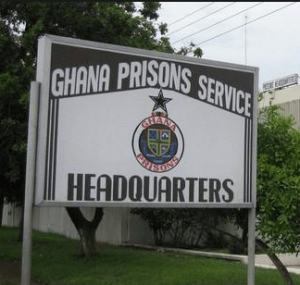Ghana Prisons Service holds external stakeholder consultation on draft Prisons Bill
 The Ghana Prisons Service (GPS), in collaboration with the Legal Resource Centre (LRC), has organised an external stakeholder consultation to solicit inputs into the draft Ghana Prisons Service Bill 2021.
The Ghana Prisons Service (GPS), in collaboration with the Legal Resource Centre (LRC), has organised an external stakeholder consultation to solicit inputs into the draft Ghana Prisons Service Bill 2021.
The two-day consultative meeting, among other things, aims to solicit views from external stakeholders to review the provisions in the draft Bill to develop a comprehensive law for governing the administration of the prison system in Ghana.
Mr Isaac K. Egyir, Director General of Prisons, speaking at the opening, said the service was the state institution responsible for the management and maintenance of the prison system and were responsible for ensuring the safe custody and welfare of prisoners and to undertake their reformation and rehabilitation whenever practicable.
He said the Prisons Act 1972, (NRCD 46) has, since its enactment 49 years ago, been the main applicable law that governed the administrative and operational activities of the Prisons Service.
However, with the changing facets and needs of the society, it was important for it to be revised or re-enacted altogether to meet new emerging trends and serve the interest of the society.
He said in recent times criminal activities were on the upsurge with increasing sophistication in the modes of committing a crime.
He said most perpetrators arrested, tried and convicted end up in Prison as incarceration was currently the main punishment awarded by the courts in criminal matters, leading to congestion in the existing prison facilities.
Mr Egyir said the Service remained an integral part of criminal justice administration and could not perform its role effectively without an enabling legal framework, which informs and govern staff behaviour, supervision and training and all the contemporary issues in prisoner administration.
“We have the vision of conforming to international standards and best practices in corrections management. This places an urgent demand on the Service to work towards the adoption of modern norms in correctional administration, including functional needs, risk and responsibility assessment of inmates, effective classification and due segregation, increased opportunities for education and training, and psychologically based offender behaviour adjustments and interventions.”
The Director-General said the draft Bill sought to incorporate the United Nations Standard Minimum Rules for the Treatment of Prisoners (the Nelson Mandela Rules) to further engender the humane treatment and rights of inmates.
It also seeks to introduce some crucial inmate specific programmes, including correctional parole under article 208(f) of the 1992 Constitution.
“It also recommends the expansion of the Prisons Directorate to include Parole, Health and Agriculture; separately. Relevant provisions of the Mental Health and Disability Acts and arrangements for vibrant prison inspection have been incorporated to ameliorate prison conditions.”
Mr Egyir said overcrowding in prisons remained a huge concern of the Prisons Service, local and international human rights bodies.
He said as part of interventions needed to solve the problem of overcrowding was the introduction of parole-based corrections under the Bill.
He said the Bill had travelled a long way to get this far and they hoped to ensure thorough and final scrutiny of the provisions in the Bill so that when passed, it would be comprehensive and time-proven in both its letter and spirit.
“Admittedly, high standard prison systems not only ensure that human rights are respected, they also give prisoners a better opportunity to turn their lives around.”
Madam Audra Lykos, Democracy, Human Rights and Governance Office Director of USAID, said the Bill was important because it would guarantee the safety of prisoners, ensure human rights and the safe custody and welfare of prisoners.
She said the sector was faced with challenges, which undermined the country’s overall rule of law performance, as one of the key justice sector institutions in Ghana was the Ghana Prisons Service.
Most prisons in Ghana house about 55 per cent more inmates than they were built to house, and the Service was navigating using its current guiding Act.
“With the ever-changing nature of crime and prison management, including the changing capacity needs of prison officers, the Bill, when passed, will enhance the management of prisons and the protection of human rights of prisoners.
Ms Daphine Lariba Nabila, Executive Director, Legal Resources Centre and Chief of Party, USAID, Justice Sector Support Activity, said even though there had been considerable progress made over the past two decades in Ghana’s criminal justice system, it still faced challenges that had led to numerous violation of human rights.
She said the Bill when passed would go a long way to address most of these human rights violation issues and make the Service effective and assure the Service of continuous assistance to ensure the Bill when passed into law would meet international standard practice.
Source: GNA
